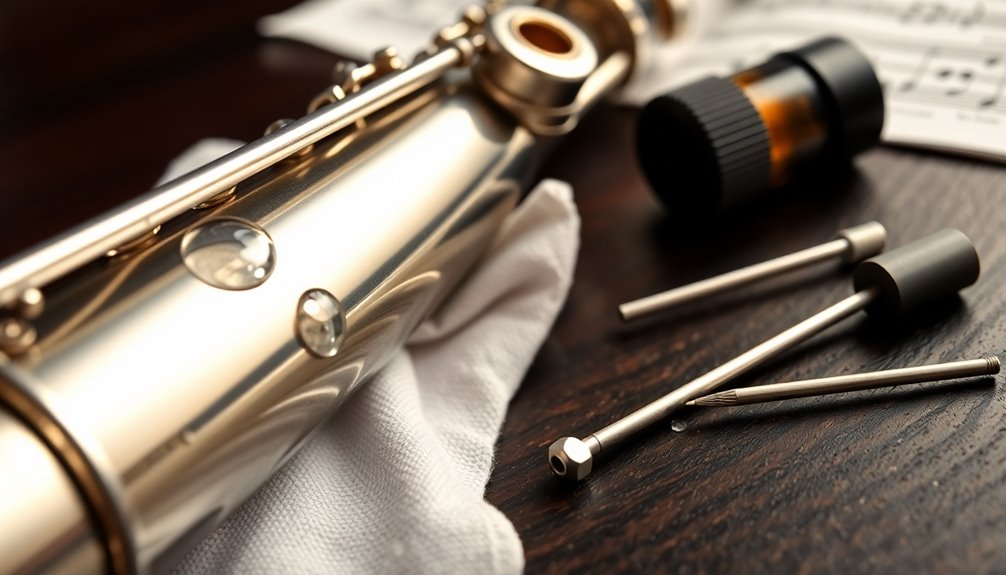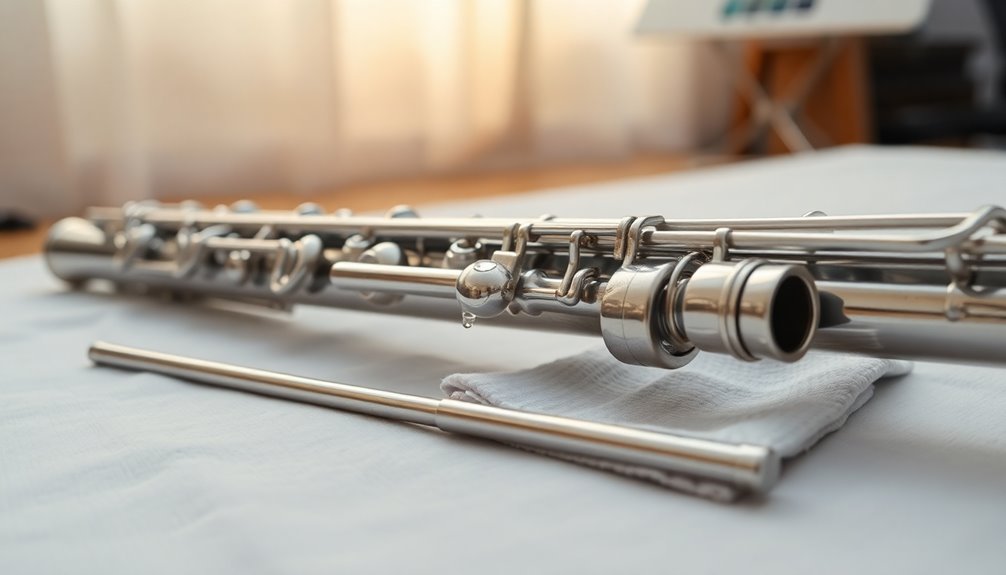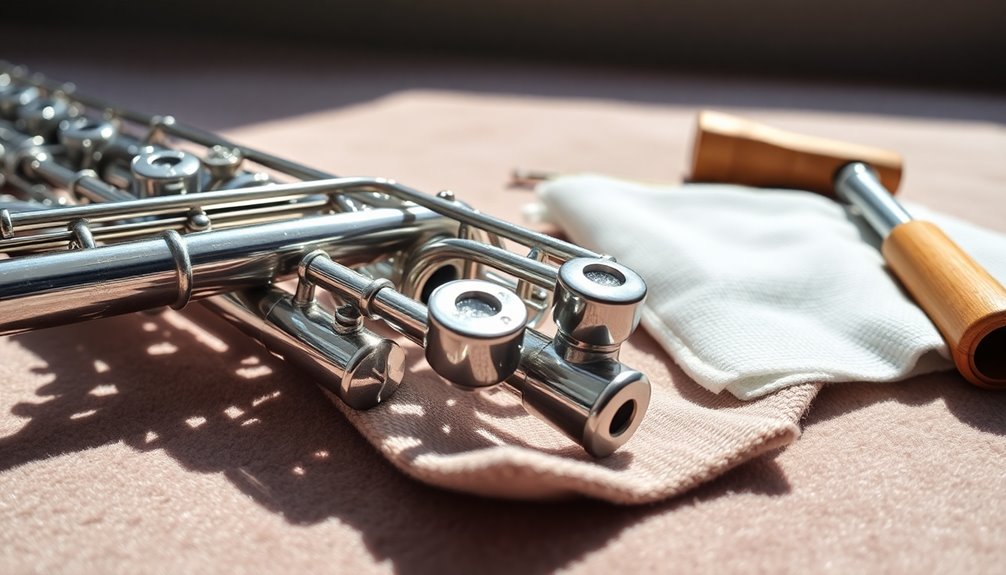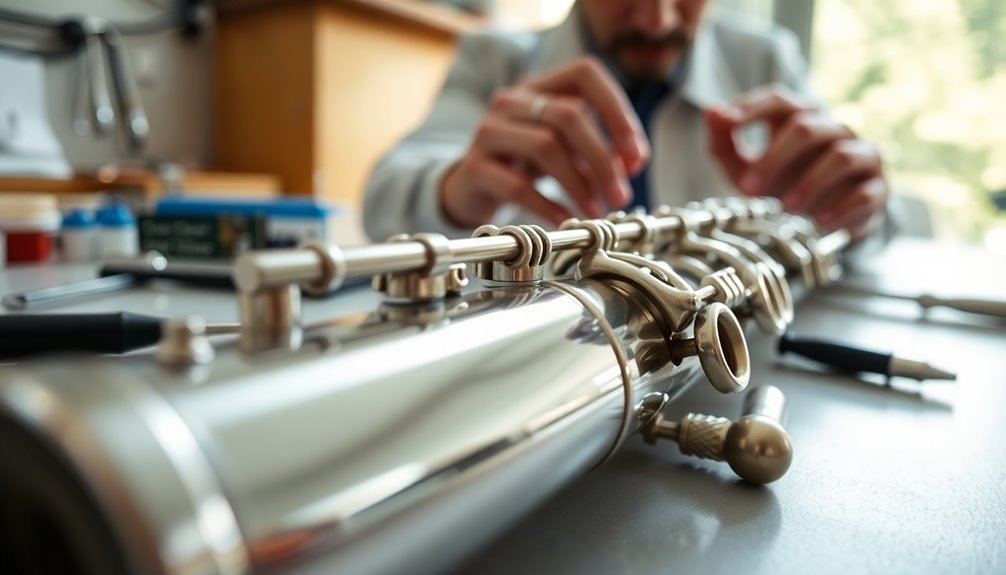Flute maintenance is vital for top performance and longevity. You should clean your flute daily to remove moisture and prevent pad damage. Always handle your instrument with clean hands to avoid transferring oils and dirt. Pay attention to signs your flute needs service, such as difficulty producing sound or misaligned keys. Regular professional servicing is essential for complex issues and provides deeper insights into your instrument's care. Establish a structured maintenance routine to keep your flute in peak condition. There's a wealth of information out there to help you maintain your flute effectively and enhance your playing experience.
Key Takeaways
- Regular maintenance, including annual professional servicing, ensures optimal performance and extends the lifespan of your flute.
- Daily cleaning practices, such as moisture removal and swabbing, prevent damage to pads and mechanisms.
- Proper handling techniques, including clean hands and secure storage, protect the flute from dirt and physical harm.
- Watch for signs of needed service, like difficulty producing sound or sticking keys, to address issues promptly.
- Build a relationship with a qualified technician for routine check-ups and repairs, enhancing your understanding of your instrument.
Importance of Regular Maintenance

Regular maintenance of your flute is essential for peak performance and longevity. By implementing a structured maintenance schedule, you guarantee your instrument remains in prime playing condition. Preventive care is key; it minimizes wear and tear and prevents minor issues from escalating into significant problems.
Start by regularly checking the pads, springs, and corks for any signs of damage or wear. Over time, these components can deteriorate, affecting your flute's sound quality and playability.
Clean the instrument meticulously after performances to avoid buildup of moisture and debris, which can lead to corrosion and other issues. Regular cleaning prevents moisture buildup, enhancing flute longevity and overall performance.
Consider scheduling a professional servicing at least once a year. This will address any complex repairs and adjustments that may be beyond your skill set.
A technician can also provide valuable insights on maintaining your specific flute model.
Daily Cleaning Practices

A consistent daily cleaning routine is essential for maintaining your flute's performance and longevity.
After each practice session, you should prioritize moisture removal to prevent damage to pads and mechanisms. Use appropriate cleaning tools to keep your instrument in top condition.
Here's what you should include in your daily practice:
- Cleaning Rod: Insert a soft cloth attached to the cleaning rod into the flute to absorb moisture.
- Flute Cloth: Use a lint-free cloth specifically designed for flutes to wipe down the exterior, ensuring it's free from fingerprints and oils.
- Swab: Employ a swab for internal cleaning, which helps remove any accumulated moisture from the body of the flute.
- Check for Debris: Regularly inspect the tone holes and pads for any debris or residue that could affect sound quality.
- Store Properly: After cleaning, always store your flute in its case to protect it from dust and environmental factors. Additionally, incorporating regular maintenance tips will ensure your flute remains in optimal condition over time.
Proper Handling Techniques

It's essential to handle your flute with care to guarantee its best performance and longevity. Start by always using clean hands when you assemble your instrument. This prevents oils and dirt from transferring to the keys and pads, which can lead to buildup and potential damage.
When you're ready to play, make certain that you conduct a careful assembly, gently connecting the headjoint and body to avoid any misalignment.
Proper storage is equally important. When you're not using your flute, keep it in its case to protect it from dust, moisture, and accidental impacts. Make sure to store the case in a stable environment, away from extreme temperatures and humidity. Avoid placing your flute on surfaces where it could easily fall or be knocked over.
Additionally, when you're transporting your flute, make certain it's securely packed. Use a padded bag or case for added protection. Regular visual inspections for signs of damage can help you catch any issues early.
Always remember to recheck your assembly after transportation, as vibrations can sometimes loosen connections. By adopting these proper handling techniques, you'll not only extend the life of your flute but also make certain that it performs at its best whenever you play.
Signs Your Flute Needs Service

Recognizing when your flute needs service is essential for maintaining its playability and sound quality. Ignoring the signs can lead to more significant issues down the line.
Here are some indicators that it's time to seek professional attention:
- Difficulty in Producing Sound: If you struggle to get a clear note, it might signal a deeper issue.
- Flute Alignment Issues: Misalignment can affect your performance and may require adjustment.
- Visible Pad Wear: Check for worn or damaged pads, as they can prevent proper sealing and impact sound quality.
- Inconsistent Pitch: If you notice your notes are flat or sharp, it may indicate problems in the mechanism.
- Key Sticking or Not Responding: Sticking keys can hinder your performance and may suggest a need for lubrication or repair.
Additionally, regular maintenance practices, such as using a flute cleaning kit, can help prevent many of these issues from arising in the first place.
Professional Repairs and Services

Maintaining your flute's ideal performance often requires professional repairs and services. As a dedicated player, you understand that even the best instruments need occasional expert attention.
It's vital to establish a service frequency that fits your playing habits and the environment in which you practice. For instance, if you play regularly or in varying climates, consider annual check-ups to keep your flute in top shape.
When thinking about repair costs, remember that investing in your instrument pays off in sound quality and longevity. Routine maintenance, such as cleaning pads and adjusting springs, can prevent more significant issues down the line.
If you notice any sticking keys, unusual noises, or air leaks, don't hesitate to consult a qualified technician. These experts can provide necessary repairs that guarantee your flute performs at its best. Additionally, regular servicing helps identify and address potential problems before they escalate into more costly repairs.
Don't overlook the importance of a trusted repair technician. Building a relationship with a professional not only gives you peace of mind but also helps you understand your instrument better.
Frequently Asked Questions
How Often Should I Replace My Flute Pads?
You should replace your flute pads based on pad replacement frequency, usually every 5 to 10 years, depending on usage.
However, keep an eye out for pad deterioration signs like air leaks, sluggish response, or visible wear. If you notice these issues, it's time for a replacement.
Regular checks will guarantee your flute maintains peak performance, allowing you to enjoy your playing experience and connect with others in the music community.
Can I Use Water to Clean My Flute?
Think of your flute as a delicate garden; it needs proper care to flourish.
You can use water to clean your flute, but make sure it's at room temperature—too hot or cold can damage the pads and keys. Clean your flute regularly, ideally after each use, to keep it in top shape.
Avoid soaking it; gently swab the inside with a soft cloth to remove moisture and maintain its beautiful sound.
What Type of Cleaning Cloth Is Best for My Flute?
When it comes to cleaning your flute, using the right cloth is essential.
Microfiber cloths are excellent for absorbing moisture and preventing lint buildup, ensuring your instrument stays pristine.
On the other hand, silk cloths offer a luxurious touch that's gentle on the surface and effective for polishing.
Whichever you choose, make sure it's soft and non-abrasive to maintain your flute's finish and sound quality.
Your instrument deserves the best care!
Are There Specific Oils for Flute Maintenance?
When it comes to flute maintenance, finding specific maintenance oils is like discovering the secret ingredient in a cherished recipe.
These oils, designed for flute care products, help lubricate key mechanisms without damaging the instrument. You'll want to use a light mineral oil or specially formulated flute oil.
Regularly applying these oils guarantees smooth operation, prolonging your flute's life and enhancing your play.
How Can I Prevent My Flute From Getting Dents?
To prevent dents in your flute, focus on proper flute storage.
Always use a padded case when you're not playing, and avoid placing heavy objects on top of it.
Keep your flute away from high-traffic areas where it could be bumped.
Regularly check the case for wear and guarantee the flute fits snugly without undue pressure.
Conclusion
In the grand scheme of music, it's ironic how a simple flute can create such beautiful sound yet fall victim to neglect. By investing a little time in regular maintenance, you can prevent major issues and guarantee your instrument remains in top shape. After all, who wouldn't want to play a flute that sounds like a dream instead of a nightmare? So, keep it clean and handle it with care—your melodies depend on it!






